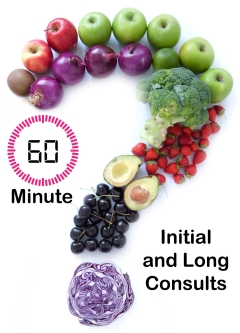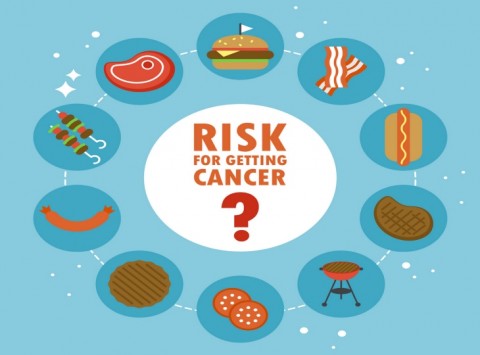DrCarney.com Blog
Processed Meat Increases Colorectal Cancer Risk
Colorectal cancer is a major public health burden, with 1.4 million new cases diagnosed worldwide in 2012 and over 130,000 new persons expected to develop the disease in 2017 in the United States. Many factors have been attributed as possible causes of colorectal cancer, including poor dietary choices and chemical carcinogens. Generous intake of processed meat products have been identified as part of the dietary factors that promote the development and growth of cancerous cells in the large intestine.
Evidence Against Processed Meats
Processed meats refer to red meat that has been transformed through processes, such as curing, salting, fermenting, and smoking, to improve the quality of its flavor or enhance its preservation. Some common examples of processed meat products include hot-dogs, bacon, ham, sausage, and deli meats. The International Agency for Research on Cancer (IARC), a division of the World Health Organization (WHO) recently classified processed meats as a Group 1 carcinogen. The significance of this classification is that processed meat products are grouped together in the same category as alcohol and smoking as one of the definite causes of different forms of cancer, including colorectal cancer.
In addition to the International Agency for Research on Cancer's (IARC) classification of processed meats as a definite carcinogen, numerous research studies have also provided strong evidence on the colorectal cancer-promoting action of processed meats. The findings of a 2011 meta-analysis conducted by a team of experts at the World Cancer Research Fund (WCRF) revealed that consistent consumption of processed meats increased the risk of developing colorectal cancer by 17%. In another study, a team of researchers from the University of Toulouse, France examined the dietary data and estimated the colorectal cancer risk of a large cohort of subjects. They investigators found out that high consumers of processed meats had 20-50% higher colorectal cancer risk than rare- or non-consumers of these types of meat products.
Processed Meats Stimulate Cancerous Cells Development
Colorectal cancer is a disease that directly results from the serial accumulations of genetic alterations in the epithelial cells lining the colon and rectum. These genetic mutations are stimulated by a potent group of human carcinogens, including N-nitroso-compounds (NOCs). Humans can be exposed to high levels of NOCs by exogenous route through regular consumption of processed meats, such as grilled bacon and smoked meat, and endogenously via the conversion of heme and nitrite found in high amounts in processed meats in the gut. NOCs are alkylating agents that react with DNA and disrupt the DNA synthesis mechanism, resulting in abnormal DNA replication. The distortion of the DNA synthesis mechanism by NOCs accelerates the development and growth of cancerous cells and tumors in the colon and rectum.
Processed Meat Products Not Part of Healthy Diet
Munching a delicious piece of hot-dog, ham, bacon, sausage, or deli meat might trigger a pleasant sensation in your taste buds, but it might also stimulate the growth of cancerous cells and tumors in your colon and rectum. Of course, you do not want to be among the millions of people suffering from colorectal cancer worldwide. Processed meat products should have no place in your diet if you want to live out your full life expectancy in good health devoid of colorectal cancer. Every bite of a processed meat product you take may put you at greater risk of developing this deadly cancer.
Additional Information:
(1) Colorectal Cancer Statistics from World Cancer Research Fund International
(2) World Health Organization Says Processed Meat Causes Cancer
(3) ACS Guidelines on Nutrition and Physical Activity for Cancer Prevention
(4) Processed meat and cancer – what you need to know
(5) Red and Processed Meat and Colorectal Cancer Incidence: Meta-Analysis of Prospective Studies
(6) Processed meat and colorectal cancer: a review of epidemiologic and experimental evidence.
(8) Download American Cancer Society's Colorectal Cancer Facts & Figures 2017-2019
Scroll Down Page to Leave Comments

Need Support?
Have we got a group for you! Join, or create, a Starch-Smart® Support Group and connect with like-minded community members today.
One Hour Phone Consult with Dr. Carney

Telephone Food Coaching Sessions with Linda Carney MD
Due to demand for nutritional advice, Dr. Carney's offers Starch-Smart® System "Dietary Care Extraordinaire" Food Coaching telephone sessions. The first sessions is always one hour. Subsequent sessions can be thirty minutes or one hour:
Click Here For 60 Minute Food Coaching Session
Please Note: Food Coaching sessions are not medical appointments and are not intended to replace your own physician. No tests will be ordered and no prescriptions will be provided.
When you subscribe to the blog, we will send you an e-mail when there are new updates on the site so you wouldn't miss them.




